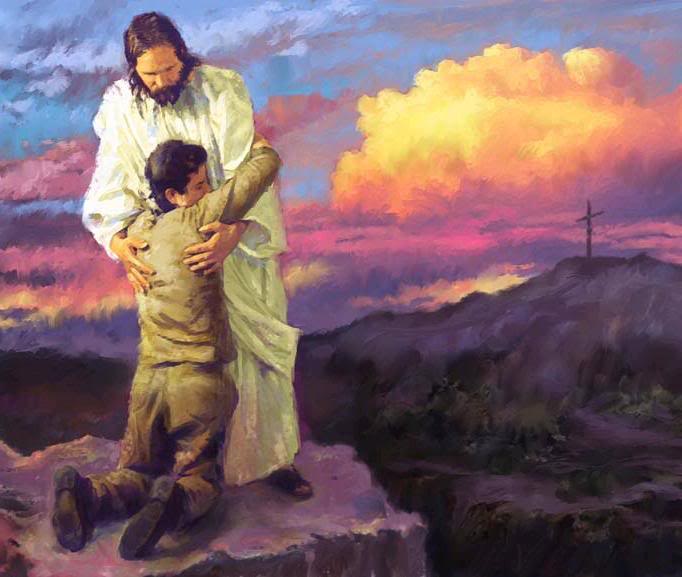
– 20th February 2022 –
Seventh Sunday in Ordinary time Year C
**************************************************
We have two commentators available from whom you may wish to choose .
Michel DeVerteuil : A Trinidadian Holy Ghost Priest, director of the Centre of Biblical renewal .
Donal Neary SJ: Editor of The Sacred Heart Messenger and National Director of The Apostleship of Prayer.
****************************************
Michel DeVerteuil
Lectio Divina with the Sunday Gospels
www.columba.ie
The Second Reading 1 Corinthians 15: 45-49.
 v 45 The first man, Adam, as scripture says, became a living soul; but the last Adam has become a life-giving spirit.
v 45 The first man, Adam, as scripture says, became a living soul; but the last Adam has become a life-giving spirit.
v 46 That is, first the one with the soul, not the spirit, and after that, the one with the spirit.
v 47 The first man, being from the earth, is earthly by nature; the second man is from heaven.
v 48 As this earthly man was, so are we on earth; and as the heavenly man is, so are we in heaven.
v 49 And we, who have been modelled on the earthly man, will be modelled on the heavenly man.
General Comments:
In this passage Paul goes into the difference that believing in the resurrection can make for us. His argument is problematic, but not so problematic that we can fail to understand it today.
Paul is always of course moving from his own beliefs. He thinks of what he believed before his trip to Damascus, and of what he had learnt once he came there and was deeply touched. Afterwards he thought about all he had learnt from his experience and what difference it now made to his life. From that source he drew some conclusions for the lives of the Corinthians. We can learn much from it today for all our lives as we live them.
Textual Comments
Vs 44 and 45. To help us do this he aims to look at two things: life as we live it without faith in the resurrection, and life as we live it with this faith. He contrasts what we see in ordinary people with what we now know in Christ.
There is originally what he calls, “the first man, Adam,” the first human being. Notice that Paul makes two additions. There is first of all the word that he lays stress on: “first”. This “first” is naturally in contrast with the “last”, the person who is Jesus, he who is the greatest of all human beings.
Then he gives the person a name, he calls him “Adam”. This is not in the original text as we find it in the Book of Genesis. For Paul in this passage, the Adam we read about there was not the first human being. He is Jesus, the pre-existent person, the one who was to give a whole new meaning to humanity. He is the truly the first Adam in the full meaning of the word.
The earthly Adam we read about in Genesis only came second. He was the one whom God fashioned from the dust of the soil. He was from the earth, the material which makes us up. He then breathed into his nostrils a breath of life so that it became as the bible itself says, “a living soul”. He is now therefore a being, one who has within him a way of judging things, what brings death or merely gives old life.
Jesus, the last Adam who is really the first, has gone further. He has now become a “life-giving spirit”. This “spirit” is the way of judging, this is what gives new life and will go on to last forever, what will really last in other words.
Jesus is the first one, the true Adam. The second is the one who we meet in the Book of Genesis.
V 46. The first one is with the soul, and not with the Spirit. Man is living but he has no further force to live by, no higher power. Christ is actually before the first Adam in time, the one we see in Genesis That which is related to psyche came first. The pneuma comes later, through Jesus’ eschatological gift. This gives the ability to decide what will truly last and what will not, what will remain even when we die. This is truly the gift of the Spirit, the one that our natural humanity cannot give
V 47. “Earth” and “earthly” here suggest a spatial contrast with what is from heaven or from a heavenly source. Paul was thinking of the words, ‘God formed us from the dust of the earth.’ The man from heaven is different, He is the son of man, the one coming on the clouds as is said in the Synoptic tradition. This one is different by nature from what is from earth. The one from earth cannot raise himself any higher than the earth. Our knowledge is limited to him and his experience.
The second man is from heaven. He can judge things from what happens higher than the earth; from what can be seen from heaven. When Paul applies the term ‘man’ to Christ, he is indicating that he is more than merely man as described in the bible, he is from heaven also, he is from two places.
V 48-49.
“Man of dust” describes the perishable nature of the first Adam and all who are made in his likeness. Death comes to all those who are descended from him We correspond to one of these two Adams. We have borne the image of the man of dust. Whether we bear the image of the man from heaven will depend on our relation to Christ. Those who through faith and baptism are united with him will be raised at his coming. He will change our lowly body to be like his own glorious body.
Gospel Reading: Luke 6:27-38
vs.27 Jesus said to his disciples: “I say this to you who are listening: Love your enemies, do good to those who hate you,
vs.28 bless those who curse you, pray for those who treat you badly.
vs.29 To the man who slaps you on one cheek, present the other cheek too; to the man who takes your cloak from you, do not refuse your tunic.
vs.30 Give to everyone who asks you, and do not ask for your property back from the man who robs you.
vs.31 Treat others as you would like them to treat you.
vs.32 If you love those who love you, what thanks can you expect? Even sinners love those who love them.
vs.33 And if you do good to those who do good to you, what thanks can you expect? For even sinners do that much.
vs.34 And if you lend to those from whom you hope to receive, what thanks can you expect? Even sinners lend to sinners to get back the same amount.
vs.35 Instead, love your enemies and do good, and lend without any hope of return. You will have a great reward, and you will be sons of the Most High, for he himself is kind to the ungrateful and the wicked.
 vs.36 Be compassionate as your Father is compassionate.
vs.36 Be compassionate as your Father is compassionate.
vs.37 Do not judge, and you will not be judged yourselves; do not condemn, and you will not be condemned yourselves; grant pardon, and you will be pardoned.
vs.38 Give, and there will be gifts for you: a full measure, pressed down, shaken together, and running over, will be poured into your lap; because the amount you measure out is the amount you will be given back.”
Scripture Reflection and prayer
We must meditate on this gospel reading as Jesus would want us to: not as a burdensome obligation (he condemned the Pharisees for imposing burdens on people), but as a celebration. “Fixing his eyes” on us (last Sunday’s reading), Jesus invites us to celebrate with him what is best in ourselves.
The language is poetical and dramatic stirring up wonder in us at the wonderful thing that is generosity of spirit. People who are generous of spirit are able to go beyond the injustices they suffer – insults (the meaning of the slap on the cheek), dishonesty, cruelty – and hear a cry for help, the desperate search for love and respect, to be recognised as a person of worth.
 Every once in a way God blesses our world with such people – St Francis of Assisi in earlier times, Gandhi and Mother Teresa in our century. The passage reminds us that they are the “sons and daughters of the Most High”, who reveal new possibilities for humanity. Those of us who have met them in person remember it as a mystical experience.
Every once in a way God blesses our world with such people – St Francis of Assisi in earlier times, Gandhi and Mother Teresa in our century. The passage reminds us that they are the “sons and daughters of the Most High”, who reveal new possibilities for humanity. Those of us who have met them in person remember it as a mystical experience.
We have known such people personally too – a father or mother, grandparent, aunt or uncle, a friend who mirrored for us the infinite compassion of God, brought sacredness to our homes, neighbourhoods, workplaces. We celebrate them with Jesus in this passage.
We celebrate our own greatness too, the fleeting moments when, as parents, teachers, friends, or church ministers, we found we had the capacity to rise above pettiness, desire for revenge and sectarianism, and reach out to others in love. We got a glimpse of the divine spark within us.
Jesus’ way of teaching poses a challenge for us today. Nowadays people think that the most effective way to run a community is to inspire fear, pass laws, build more prisons, bring back the death penalty. As is commonly said, “this is the only language they understand.”
Jesus used threats from time to time but it was always with a loving purpose. As the passage shows, he knew that the only way to get us to move forward is to meet us at the level where we will freely choose to be generous.
Love therefore is still the most powerful force in the world, in dealing with individuals as well as in building communities. The passage ends by reminding us how generosity of spirit brings out the best in people and leads to abundance for all.
We think of the explosion of love which greeted the deaths of Princess Diana and Mother Teresa, we think of parents celebrating their golden anniversaries surrounded with love, reaping the rewards of their years of self-sacrifice.
This passage is also a teaching on economics. “A full measure pressed down, shaken together and running over” is an image of an abundant crop of grain. Our world is crippled by shortages of food because agricultural policies are guided by selfishness and meanness. The passage tells us that a culture of love will bring about a world of abundance.
Lord, we thank you for the sons and daughters of the Most High you send us who touch us at the deepest level of ourselves.
They show us that we too can bless those who curse us,
pray for those who treat us badly,
reach out to those who have slapped us on the cheek,
offer our tunic to someone who had taken our cloak,
give whenever asked, not ask for our property back when we are robbed,
treat others as we would like them to treat us, lend without any hope of return.
They make us aware that there is much more to us than our badness,
we are your sons and daughters, kind to the ungrateful and the wicked, as you are.
We thank you for the extraordinary outpouring of love
at the deaths of people whose sins have been noted
but who made a difference in our lives.
They themselves were not judgmental,
and in death no one passed judgment on them,
they who did not condemn were not condemned,
having pardoned much in their lifetimes, they were now pardoned,
to them who had given generously, many gifts were given.
Lord, we pray that our leaders will inspire generosity of spirit
among those involved in agriculture,
so that there will be food for all –
a full measure, pressed down and shaken together and running over
will be poured into the lap of humanity.
*******************************************************
Donal Neary S.J.
Gospel reflections
www.messenger.ie/bookshop/
Walk in the Shoes of the Other
A compassionate heart reaches out to many; the Gospel today reaches beyond our own circle to reach many others. This will be the constant call of Jesus. When he wants to say what His father is like he says ‘Be compassionate like him.’
Compassion is when we can walk in another’s shoes, and try to see, hear and feel the world of another, particularly in bad times. It flows from mercy, which is the biggest quality in Jesus.
We like when another can enter into our world without judgement and can accept us in love – Jesus tells us to note this and then practice the same.
 The call is to be compassionate to each other and the earth! The letter of Pope Francis, Lauditio Si calls for a compassionate care of the earth, as we hear the cry of the poor:that we treat the earth with the love it deserves.
The call is to be compassionate to each other and the earth! The letter of Pope Francis, Lauditio Si calls for a compassionate care of the earth, as we hear the cry of the poor:that we treat the earth with the love it deserves.
Compassion for others and the earth includes our gratitude. We can look deeply into the people we are close to and thank God (for them!) and for what we like in them and value. We can look long at creation’s beauty in the highest Himalayan mountain and the smallest plant and recognise that all is the gift of God. We are to care for the earth and till it, and accept the care of the earth for us, giving us food, drink and refreshment. We are to care for each other to bring out the best in each other. This is one of the Pope’s central themes about care of creation.
Lord, thank you for the beauty of the earth and of humanity;
may we reverence that beauty for it is from you